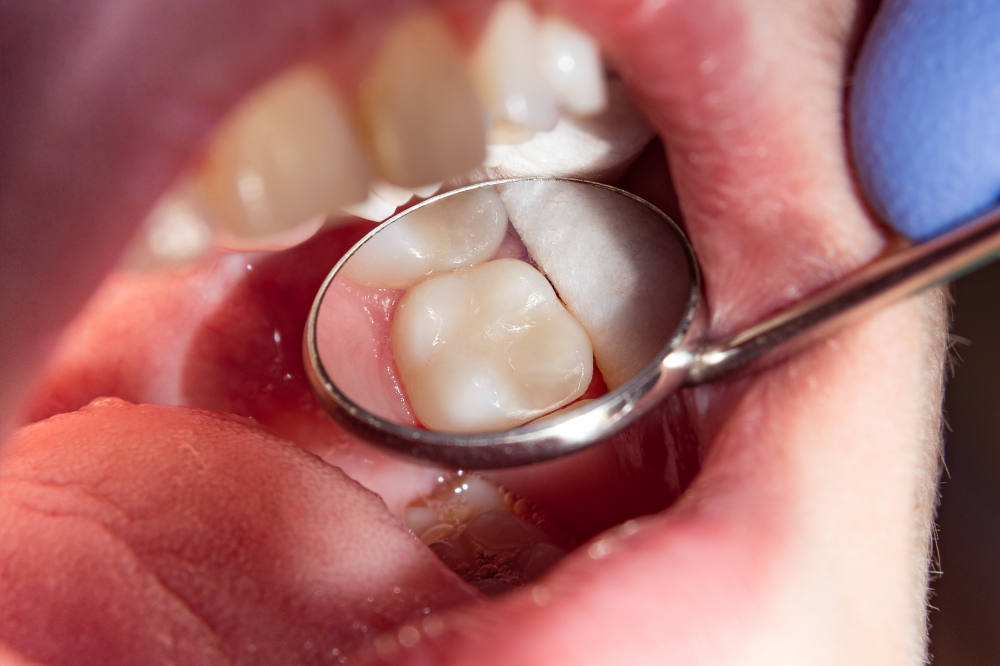
Root Canal Treatment

Saving Your Natural Tooth
A root canal treatment is one of the most effective procedures for saving a tooth that has been severely decayed or infected. Instead of extracting the tooth, a root canal removes the infected pulp, cleans and disinfects the inner canals, and seals the tooth to restore its strength and function. At Gramercy Dental Group, we use advanced technology, gentle techniques, and modern anesthetics to ensure that the procedure is comfortable and pain-free.
If you’re experiencing tooth pain, sensitivity, or swelling, a root canal might be the solution to preserve your natural tooth and prevent further complications.

What is a Root Canal?
A root canal is a specialized endodontic procedure performed when the soft tissue inside the tooth, known as the pulp, becomes infected or inflamed due to:
- Deep decay (from an untreated cavity)
- Cracks or fractures in the tooth
- Trauma or injury that exposes the pulp
- Multiple dental procedures on the same tooth
When bacteria invade the pulp, it can cause intense pain, swelling, and even abscess formation. A root canal removes the infected tissue, prevents the spread of infection, and allows you to keep your natural tooth instead of losing it.
Signs You May Need a Root Canal
Some common symptoms that indicate you may need a root canal include:
Severe or Lingering Tooth Pain
Pain that doesn’t go away, especially when biting or chewing.
Sensitivity to Hot and Cold
If your tooth aches even after the temperature source is removed.
Swollen or Tender Gums
Swelling around the affected tooth or gum abscess formation.
Darkening of the Tooth
A discolored tooth may indicate nerve damage.
Pimple-like Bump on the Gums
This could be a sign of an abscess.
Ignoring these symptoms can result in severe infections, abscesses, and even tooth loss, so prompt treatment is crucial.
Benefits of a Root Canal Treatment
A root canal not only eliminates pain but also preserves your natural tooth. Here are the top benefits:
Saves Your Natural Tooth
Instead of extracting the tooth, a root canal allows you to keep your original tooth structure, which is the best long-term option for oral health.
Eliminates Pain & Infection
By removing the infected tissue, a root canal immediately relieves pain and prevents the infection from spreading to other teeth or even into the bloodstream.
Restores Function & Strength
Once restored with a crown, your tooth will be fully functional, allowing you to chew, speak, and smile confidently without discomfort.
Prevents More Serious Dental Issues
Delaying treatment can lead to tooth loss, abscesses, and bone deterioration, requiring more complex and expensive treatments like dental implants or bridges.
Long-Lasting & Cost-Effective
A well-done root canal can last a lifetime with proper care, making it a cost-effective and permanent solution compared to tooth replacement options.


The Root Canal Procedure: What to Expect
Many patients feel anxious about root canals due to misconceptions about pain, but the truth is modern root canals are no more uncomfortable than getting a filling. Here’s what you can expect during the procedure:
Step 1: Diagnosis & X-Rays
- We begin with a comprehensive examination and take digital X-rays to assess the extent of the infection and determine if a root canal is necessary.
Step 2: Local Anesthesia for Comfort
- A local anesthetic is administered to completely numb the tooth and surrounding area, ensuring a pain-free experience.
- For patients with dental anxiety, we also offer sedation options to help you feel relaxed.
Step 3: Removing the Infection
- A small opening is made in the tooth to access the infected pulp.
- Using specialized instruments, we carefully remove the infected or dead pulp, eliminating bacteria and preventing further infection.
Step 4: Cleaning & Shaping the Canals
- The inside of the tooth and root canals are thoroughly cleaned and disinfected to remove any remaining bacteria.
- The canals are then shaped and prepared to be filled.
Step 5: Sealing the Tooth
- The cleaned canals are filled with a biocompatible material (gutta-percha) to seal them and prevent reinfection.
- A temporary filling is placed to protect the tooth until the final restoration is completed.
Step 6: Final Restoration with a Crown
- Since a root canal-treated tooth can become more brittle, a custom dental crown is usually placed to restore strength, function, and appearance.
- Once the crown is placed, the tooth is fully functional and will last for many years with proper care.
The entire procedure typically takes one to two visits, depending on the complexity of the case.

Post-Treatment Care & Recovery
After a root canal, mild discomfort or soreness is normal for a few days, but it can be managed with over-the-counter pain relievers like ibuprofen.
- Avoid chewing on hard foods until your permanent crown is placed.
- Maintain excellent oral hygiene (brushing and flossing daily).
- Attend follow-up visits to monitor healing and place the final crown.
- Regular dental checkups help ensure the tooth remains healthy long-term.
Most patients return to normal activities the next day, with little to no disruption in daily life.
Don’t Wait – Save Your Tooth Today!
If you’re experiencing severe tooth pain, sensitivity, or swelling, a root canal can eliminate pain and save your natural tooth. Early treatment leads to better outcomes and a healthier smile.
Call us today to schedule your consultation and restore your smile with expert root canal treatment!
Don’t Wait – Save Your Tooth Today!
If you’re experiencing severe tooth pain, sensitivity, or swelling, a root canal can eliminate pain and save your natural tooth. Early treatment leads to better outcomes and a healthier smile.
Call us today to schedule your consultation and restore your smile with expert root canal treatment!
Frequently Asked Questions About Root Canals
Does a root canal hurt?
No! Thanks to modern anesthesia and sedation options, the procedure is virtually painless. The pain you feel before the root canal (from the infection) is far worse than the procedure itself!
How long does a root canal take?
Most root canals take 60 to 90 minutes and can be completed in one or two visits.
Is a crown necessary after a root canal?
Yes, in most cases. A crown protects the tooth from fractures and restores its strength, preventing future damage.
How long does a root canal last?
With proper care, a root canal-treated tooth can last a lifetime. Regular checkups and good oral hygiene are essential.
What happens if I don’t get a root canal?
If left untreated, the infection can spread to other teeth, gums, and even the bloodstream, leading to serious health risks. The only alternative is tooth extraction, which then requires a dental implant or bridge to restore function.
